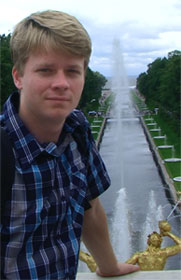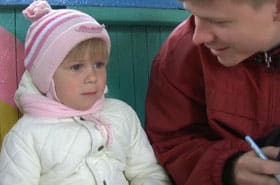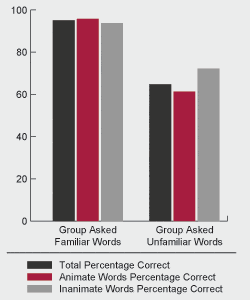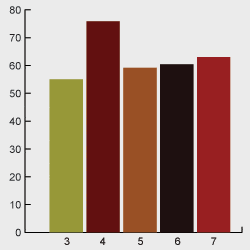SRAS: You are currently majoring in Russian Studies and Psychology at Stetson University – what got you interested in Russia?
Mark Lowry: I served a two year mission for the LDS church in Russia helping out church members there. While there, I became proficient in Russian and when I returned in 2008 I decided to major in Russian Studies (and also in Psychology).

SRAS: I know that the LDS Chruch in Russia stopped sending missionaries for a time in 2008 due to increased difficulties in getting visas for their representatives. Out of curiosity, do you know if the church continues activities in Russia?
ML: The LDS church still continues its activities, and even still sends representatives from the US to Russia, except there are significantly less of them (about 1/4 or so).
SRAS: What kind of research did you do at the Sestroretsk preschool, how did you come with the idea for it, and how did you prepare to research abroad?
ML: Last year, while I was taking both child psychology and cognitive psychology and wondering how I could fill the requirements to do a senior project for two majors, I came up with this idea. I thought about the Russian language and grammar acquisition and thought that I could do part of my research in Russia over the summer. I applied for a grant, received it and SRAS was able to help me get a Russian visa.
I did research on how kids acquire grammar, whether they imitate what they hear or are able to “figure it out” on their own.
I was testing whether or not kids could tell whether a word that they have never heard of before was “alive” or not just by grammar. Russian grammar distinguishes between inanimate and animate nouns in the accusative case, declining the words differently. Basically, if an unfamiliar word is in the animate case (i.e. the direct object) it changes in a certain way. If kids can figure out that a word refers to something “alive” based purely on whether they recognize how it changes in a sentence, then it shows they have a grasp of how grammar works even though no one has taught it to them. It is sort of like in English if you ask a 3 yr old whether the word “protons” is singular or plural, but a bit more complex.
SRAS: Out of curiosity, why did you elect to use high-level vocabulary rather than nonsense words like “lipligons” for example?

ML: I was originally going to use nonsense words, but decided to use mostly English cognates used in business that the preschoolers wouldn’t know. I figured that theoretically it wouldn’t make a difference, and would be just as unfamiliar to them. For example I used инвестор instead of the Russian word вкладчик. It was easier this way because in the back of my Russian English dictionary there is a section with only business terms. It saved me the trouble of thinking up of words and then making sure they weren’t real words.
SRAS: The grant you applied for was a SURE Grant. What can you tell us about this award?
ML: SURE stands for “Stetson Undergraduate Research Experience.” Stetson University offers $2000 to a few students who apply and are accepted, to do their research on their own over the summer between their junior and senior years. I would say to anyone that if their school offers an opportunity to do undergraduate research to do it! It is very fulfilling to be able to come up with your own idea, do research on your own time and to learn something about the world and yourself. There are many things that anyone can do research on in Russia, whether it be language, the environment, culture, politics etc.
SRAS: What were the greatest challenges in carrying out your research?
ML: The biggest challenge was getting everything squared away with the visa, and fortunately SRAS was able to help significantly. I would have been lost without help from (SRAS Program Director) Renee (Stillings).
It wasn’t that everything else was easy, everything else was probably in actuality more demanding. Getting the visa was difficult because it was stressful and not exciting. I had to apply for it, register it, make sure I had a copy of the invitation etc. The research, although difficult, was satisfying and I didn’t think that it was work because I had fun planning it and carrying it out. I guess the main difference was that I liked doing the research, but trying to get the visa sorted out was a chore. SRAS and Renee were a big support and made it seem manageable.

SRAS: The question we are sure everyone is waiting for: What were the findings from your research?
ML: I found that kids do actively figure out grammar on their own (even if they don’t realize it themselves). If they couldn’t, they would only guess whether a word was “alive” or not correctly about 50% of the time. In reality, they did significantly better (around 64% correct, with some scoring around 80%). However, as they got older, they did a bit worse, indicating that imitation also plays an important role.
Specifically, Four year-olds were able to answer about 75% of the questions correctly. Five-, six-, and seven-year-olds were only able to get about 60% of the questions right.
The research shows that early on children do develop broad rules, but then as they get older they have to learn the specifics and can’t rely on those rules as much anymore. So yes, they do lose those early rules they developed independently as they age (to a certain extent). Of course, they could be simply refining them. One thing that could have influenced the results is the so-called “partitive” where inanimate objects that act as the direct object take genitive endings to indicate “some” (i.e. Я хочу сахара / I want some sugar). Five-, six-, and seven-year-olds may have developed a rule for the partitive and can’t rely solely on their knowledge of the accusative case anymore.

The rules of Russian grammar are complex, and kids can’t just use one rule for everything, and so as they age, they rely more on how others speak in order to use grammar correctly (to a certain extent). It’s a complex relationship between cognition and conditioning (if we’re talking about psychology).
I guess you could just say, “Children keep refining and/or creating new rules as they age that replace their old ones.” I hope that makes sense.
SRAS: Facinating. Did you get a chance to travel around Russia in the time that you were there? What can you tell us about your Russia experience outside of your research?
ML: I did get to travel around Russia and visit some other cities there. Besides St. Petersburg and Sestroretsk I was able to visit Pskov. I was there in the middle of July, which happened to be the “Founder’s Day” (день города). It was amazing. There were all sorts of festivities and fireworks around 11:00 PM. I got to pick berries with some of my Russian friends and just relax.
SRAS: You are scheduled to graduate in spring of 2010 – what are your plans after graduation? What are your career goals?
ML: At this point, I’m not exactly sure how things are going to develop after graduation. I would like to go to graduate school for psychology, but there are so many different “schools” of psychology (i.e. behavioral, cognitive, biological, neurological… etc) that it is hard to decide. I am somewhat interested in neuropsychology. I’m also thinking about doing something with Russian studies, but I’m just not sure. I would like to take off a year and possibly work in Russia and/or see what kind of contacts I can make and what paths present themselves.
As to working in Russia, I don’t have anything really planned out yet, except to possibly teach English somehow (through English First or something). I did find a Neuropsychological Group in St. Petersburg, and have also tried to contact them about applying.
Contact SRAS for more information on how we can help scholars with visas, housing, insurance, and other on-the-ground support in Russia.





